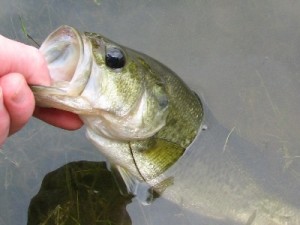 The North Carolina Wildlife Resources Commission (NCWRC) recently released a series of tips to help largemouth bass anglers who practice catch-and-release fishing this summer.
The North Carolina Wildlife Resources Commission (NCWRC) recently released a series of tips to help largemouth bass anglers who practice catch-and-release fishing this summer.
According to NCWRC, summer can produce high water temperatures and lower dissolved oxygen levels in reservoirs and rivers, conditions that can stress largemouth bass. To minimize stress on fish, an angler who plans to catch and release the fish should land the fish quickly and handle it as little as possible.
“Try not to remove the fish from the water, even when you’re removing the hook from the fish’s mouth,” said Christian Waters, Inland Fisheries Division chief for the N.C. Wildlife Resources Commission. “Handle the fish as little as possible to help reduce the loss of slime coat, which is the fish’s main defense against infection and disease.”
The following suggestions from NCWRC include largemouth bass catch and release tips, livewell tips, tournament guidelines, and other additional information.
Catch and Release Tips:
- Wet your hands before you touch a fish
- Return the fish quickly to the water if you do not plan to keep it or place it in a livewell
- Use a knotless nylon or rubber-coated net instead of a knotted nylon net
Livewell Tips:
- Know the capacity of the livewell and do not exceeding a ratio of more than 1 pound of bass per gallon of water
- Run a recirculating pump continuously if more than 5 pounds of bass are in the livewell
- Use aerators or oxygen-injection systems to keep the water’s oxygen level above 5 parts per million (ppm)
- Keep livewell water about 5 degrees below the reservoir or river temperature by adding block ice
- Tournament participants should fill weigh-in bags with livewell water, not reservoir or river water, before putting in their catch
- Tournament anglers should put only five fish in a bag, fewer if the fish exceed 4 pounds each
- Limit the amount of time that fish are held in bags to less than 2 minutes.
Fishing Tournaments
Fishing tournament organizers can do their part to help keep fish alive by adopting best handling practices at all events. These include staggering weigh-in times to reduce the time fish are held in weigh-in bags, arranging for release boats to return bass quickly to the water and equipping recovery stations with oxygen and recirculating water.
Organizers also can provide holding tanks during the weigh-in with water 5 degrees below the reservoir or river temperature and with oxygen levels above 5 ppm. They also can reduce the number of competitive fishing hours.
An alternative to the traditional weigh-in tournament is to conduct a “paper tournament,” which doesn’t require a weigh-in. “This is an especially helpful strategy during periods of extreme heat,” Waters added.
More Information
More information on keeping bass alive, including the B.A.S.S.-produced publication, “Keeping Bass Alive: A Guidebook for Tournament Bass Anglers and Organizers,” is available on the NCWRC website: www.ncwildlife.org/fishing.
Also available from NCWRC is a “Keeping Bass Alive” card, suitable for downloading and printing that provides tips for both recreational and tournament anglers.
source: North Carolina Wildlife Resources Commission